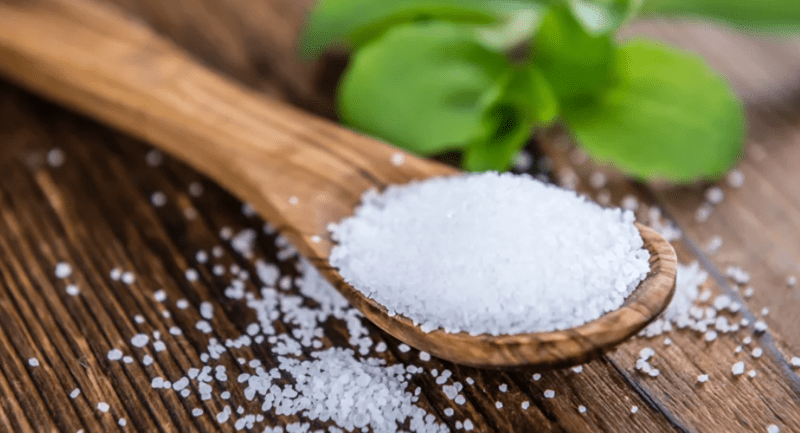Study reveals elevated Cardiovascular risks from popular sugar substitute Erythritol

This latest research supports those findings by showing a marked increase in clotting risk following erythritol consumption.
A recent study from the Cleveland Clinic has revealed significant cardiovascular risks and increased blood clotting associated with erythritol, a popular low-carb sugar substitute.
Erythritol, a low-calorie sugar commonly found in keto products (Low-carb alternatives to common comfort foods, staples, and snacks) and other low-carb foods, has now been linked to increased cardiovascular risks, including blood clotting, which can lead to heart attacks and strokes.
More To Read
- The hidden stress culprit: How your daily diet is secretly wrecking your mood
- Surviving the next pandemic could depend on where you live
- WHO urges countries to protect health budgets amid aid reductions
- Turkana moves to safeguard health with bold One Health Bill
- Genetic tests for cancer can give uncertain results: new science is making the picture clearer to guide treatment
- What chaos at the US CDC could mean for the rest of the world
Published in Arteriosclerosis, Thrombosis, and Vascular Biology, the study examined how 30 grams of erythritol affect blood clotting compared to glucose.
Researchers found that erythritol consumption led to a substantial increase in blood erythritol levels and heightened platelet clumping, which suggests a greater risk of clotting. In contrast, glucose did not produce similar effects.
Since 1990, erythritol has been safely used as a sweetener and flavor enhancer in a variety of foods and drinks, and it is approved in over 60 countries. It is found in products like coffee, tea, juice, soft drinks, flavored waters, confections, cookies, sugar-free gum, and more.
Erythritol's mild sweetness allows it to replace sugar directly, while sweeter substitutes often need extra ingredients that can change the texture of baked goods.
Dr Stanley Hazen, the lead cardiologist in the study, highlighted that while glucose did not affect blood clotting, erythritol consumption resulted in a dramatic 1,000-fold rise in erythritol levels in the blood and increased platelet aggregation.
“This indicates that erythritol may significantly enhance the risk of blood clots.”
The study involved two groups of healthy volunteers who fasted overnight. One group consumed a drink with 30 grams of glucose, and the other group consumed 30 grams of erythritol. Blood samples taken 30 minutes later revealed that only those who drank erythritol showed increased platelet aggregation, suggesting a heightened risk of clotting.
Erythritol, which can be found naturally in fruits and vegetables but is present in much higher concentrations in processed foods, is produced by fermenting corn. Dr. Hazen pointed out that the levels of erythritol used in processed foods are huge.
Previous studies from Hazen’s lab had also raised concerns about erythritol and other sugar alcohols, indicating they might make blood platelets more prone to clumping and blocking blood vessels.
This latest research supports those findings by showing a marked increase in clotting risk following erythritol consumption.
Although erythritol and other artificial sweeteners are currently deemed "generally recognised as safe" (GRAS) by the FDA, Dr. Hazen and other experts are calling for a closer examination of their long-term effects.
In Europe, regulatory bodies are already reviewing data to better understand the potential risks associated with high levels of erythritol in foods.
Registered dietitian Valisa Hedrick from Virginia Tech, who was not involved in the study, noted that while the findings are concerning, it is also important to consider the risks associated with high sugar consumption, which can also lead to elevated blood glucose levels and related health issues.
"This new research highlights the need for further investigation into erythritol's effects on cardiovascular health," said Valisa.
Previous research has shown a connection between high blood levels of erythritol and serious cardiovascular events. Erythritol can make platelets more active, leading to larger blood clots.
In 2023, the European Food Safety Authority updated its guidelines, reducing the recommended daily intake of erythritol to 0.5 grams per kilogram of body weight (about 35 grams for an average adult weighing 70 kg). This new limit aims to prevent potential issues like diarrhea and electrolyte imbalances from long-term use.
Previously, in 2015, studies found that erythritol could cause mild gastrointestinal issues at doses where it was 1.6% of beverages, but it did not have a laxative effect at that level. The tolerance limit was set at 0.78 grams per kilogram of body weight for adults and 0.71 grams for children.
Top Stories Today













































